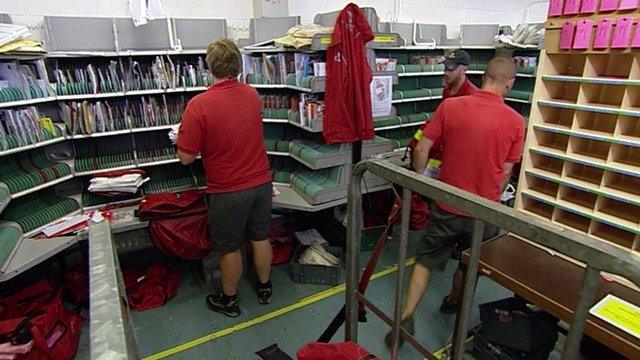Royal Mail shares set to begin trading
- Published
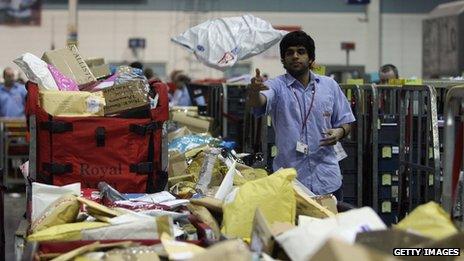
Royal Mail is about to make its stock market debut, with each share priced at 330p, giving the company an initial value of £3.3bn.
Demand for shares far outstripped supply, with almost 700,000 private investors applying for shares.
Private investors who applied for the minimum £750 up to £10,000 will receive shares worth £749.10. Applications for more than £10,000 will receive nothing.
Royal Mail employees will have their applications met up to £10,000.
Employees were also given a free allocation of shares, with 99.7% of staff taking up the offer.
But Billy Hayes, general secretary of the Communication Workers Union, said he did not expect the take-up to affect the outcome of a strike ballot next Wednesday.
He told the BBC: "In austerity Britain no one is going to turn down free money. The real test will be next Wednesday, and I am convinced that postal workers will vote for action."
Billy Hayes, Communication Workers Union: "They nationalised the debt and they privatised the profit"
'Right balance'
Royal Mail shares will not be listed on the Stock Exchange officially until next Tuesday.
But conditional trading - where City professionals can buy and sell shares between each other before official trading begins - starts on from Friday, giving an initial indication of the value of the shares.
The retail share offer was seven times oversubscribed, prompting criticism that the privatisation undervalues Royal Mail.
But Business Secretary Vince Cable has said the listing gives the taxpayer value for money.
"We have struck the right balance, increasing the proportion of shares going to small investors to ensure they get their fair share and ensuring the employees get a 10% stake in the business," he said.
Mr Cable added that the listing also achieved a long term ownership structure enabling Royal Mail to be a "successful enterprise".
Chief executive of the Royal Mail Moya Greene said it was "gratifying" that the firm had the confidence of "such a strong group of investors".
Ms Greene said: "With these institutions, many of whom are responsible for people's pensions and savings, and with UK citizens and our own people backing Royal Mail, we are much better positioned to be the universal service provider for the country."
BBC business editor Robert Peston said: "The allocation of shares turns out to be very simple. If you've applied for up to £10,000 of shares, you will get £750 worth of shares. It is no more complicated than that."
Strikes?
Mr Peston said investment institutions "put up money worth a staggering 20 times the value of the shares on offer to them."
He said that on his calculation, retail and institutional investors offered £27bn for shares priced at £1.7bn.
The argument about whether Royal Mail was priced too cheaply will run and run, he added.
As the shares begin trading, postal workers in the Communication Workers Union (CWU) are still being balloted over whether to carry out a nationwide strike over privatisation, pay and pensions. The ballot began last Friday.
Voting in the strike ballot will close on 16 October, which under the current rules on industrial action means the earliest a strike could take place is 23 October.
In the official prospectus for the share issuing, the Royal Mail had cautioned that labour posed a potential risk for the share price.
A protest is planned for Friday morning by demonstrators dressed as robbers, to coincide with the first day of trading, outside the London Stock Exchange.
Conditional trading
Richard Hunter, head of equities at Hargreaves Lansdown, said the period between conditional trading and the formal listing on Tuesday could be compared to the time between exchanging on a house, and completion.
"It's a historical, and legal thing. During conditional trading you can trade the shares in a normal way, but if for any reason the IPO [Initial Public Offering] is pulled, those share trades would be unwound," he said.
Normally this period lasts for a week, but for Royal Mail it will be just Friday and Monday.
Mr Hunter said the public could buy shares normally from Friday but could not put them in tax related products, such as ISAs, until Tuesday.
Here is a selection of your views on the Royal Mail shares:
Maynard Chitty from Liverpool:I worked as a postman many years ago for a short time and so I feel I have an emotional connection with the Royal Mail. That connection and looking at it practically made me want to apply for shares. It's such a behemoth, I can't see it failing to make money. I'm not interested in the short term though - I intend to hold Royal Mail shares as a nest egg for donkey's years. The sell-off has been in the offing for months and I've kept my eye on it. As I'm so depressed by the interest rates offered on ISAs etc, I thought I'd apply for shares.
John Dawson from London: I am originally from Stevenston in Ayrshire and many ordinary working class people here bought shares in privatised companies like BT and British Gas and the returns have been first-class. I expect the returns for small private shareholders will be just as good for those who invested and applied for shares in Royal Mail.
Chris Donohue from Epsom, Surrey: I'm ok, because I went for the minimum allocation, £750, to make sure I got some and my wife did the same, but I think it's highly irregular to exclude larger investors. Yes smaller investors should be given a larger proportion but the larger investors could be given a scaled down amount. Excluding them entirely takes away their rights.
Steve from Leicestershire: I work for Royal Mail and I despair at some of my colleagues who are looking forward to making a fast buck. They will pay for this many times over as our terms and conditions are eroded. The public will also be a loser as I fear it is inevitable that the Universal Service Obligation will be ditched in the future to satisfy shareholders.
Jamie from Edinburgh: I put my name in the hat for £750 worth of shares on Monday and that amount came out of my account today so I'm guessing I was lucky enough to receive 100% of my allocation. I'm delighted as this is my first venture into this type of thing. I'll probably sell quickly with the hope of doubling my money. I'm looking for a quick return as I'm saving a deposit to buy a house.
Peter Brown: I'm by no means a "big" investor. I moved money out of savings and used overdrafts to apply for the full £10,000 allocation, thinking that I would stand a better chance of receiving some shares. Now it seems I won't get any! I think a fairer approach would have been to publicize the selection rules in advance of the placing.
Keith Webb from Winchester: The government is right in pricing the shares attractively, as this ensured that the take up would be a success. Over the years they will make a lot more from stamp duty and things like capital gains tax. Widening share ownership is a good thing and those with sense will, as I and my wife have done, buy their shares in an ISA. During the past year, our share ISAs have increased in value by nearly 100%, because I have gambled by investing in bank and construction shares.
David Fletcher from Hereford: I have been a postman for 25 years and seen many changes to the business. I am certainly not in favour of the privatisation as I think the service will go downhill as more and more cuts are made in an attempt to make bigger and bigger profits for the "fat cat" investors. However, I wasn't going to look a gift horse in the mouth and decided to borrow some money from a family member and use my employee preference option to purchase some shares. After all, in three years' time when I am on minimum wage and all my benefits have been eroded the money will come in very useful.
Anonymous from Lincolnshire: I have been a postman for the last five years and was always proud to wear the uniform. Now however I can no longer say that as customers are complaining about the level of service we now provide and all of this is down to the government's push to privatise. As for Vince Cable saying only 358 postmen have declined shares we are hardly going to cut our noses off to spite our faces. No postman I have spoken to wants this privatisation and neither does any member of the public but since when did the government ever listen to the people that vote them in.
- Published10 October 2013
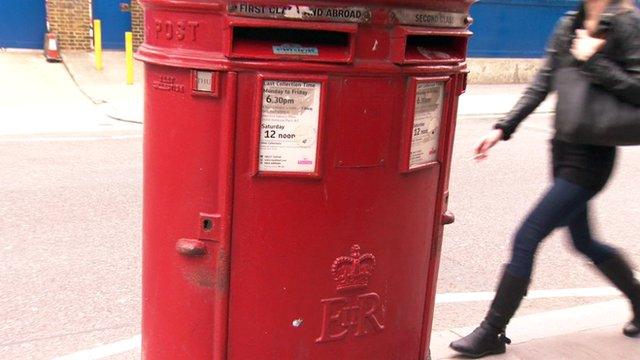
- Published7 October 2013
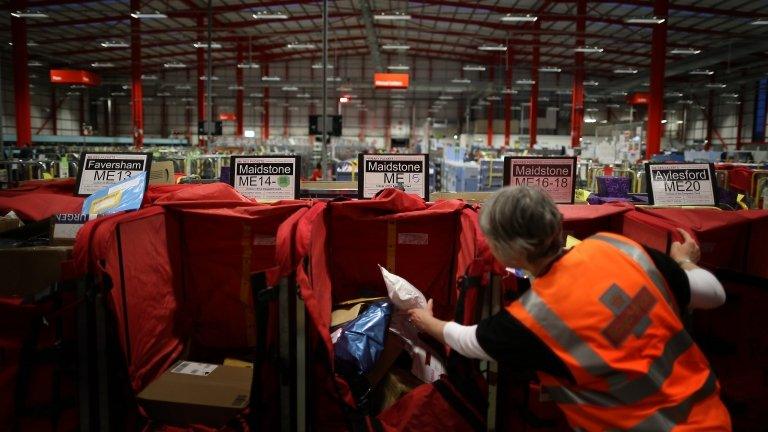
- Published8 October 2013
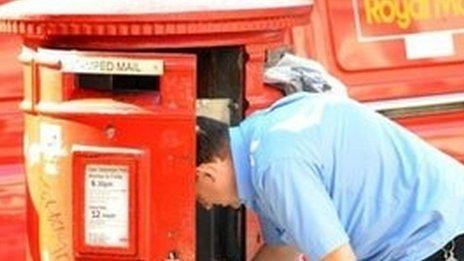
- Published7 October 2013
